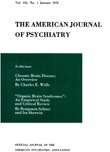Drug Therapy in Alcoholism
Abstract
Drug therapy for alcoholism covers three major areas: chronic alcoholism, acute alcohal intoxication, and the withdrawal syndrome. No drug therapy has yet been proven of significant value in long-term treatment; however, preliminary studies are encouraging. The treatment of acute alcohol intoxication may include sedatives or glucose administration, depending on the episode. The value of paraldehyde and chlordiazepoxide in the management of the withdrawal syndrome appears to be well established. The authors suggest that the efficacy of these drugs in the acute toxic states may be related to the restoration of normal REM and Delta sleep.
Access content
To read the fulltext, please use one of the options below to sign in or purchase access.- Personal login
- Institutional Login
- Sign in via OpenAthens
- Register for access
-
Please login/register if you wish to pair your device and check access availability.
Not a subscriber?
PsychiatryOnline subscription options offer access to the DSM-5 library, books, journals, CME, and patient resources. This all-in-one virtual library provides psychiatrists and mental health professionals with key resources for diagnosis, treatment, research, and professional development.
Need more help? PsychiatryOnline Customer Service may be reached by emailing [email protected] or by calling 800-368-5777 (in the U.S.) or 703-907-7322 (outside the U.S.).



